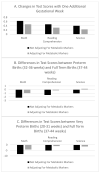Gestational Age, Newborn Metabolic Markers and Academic Achievement
- PMID: 35162571
- PMCID: PMC8834716
- DOI: 10.3390/ijerph19031549
Gestational Age, Newborn Metabolic Markers and Academic Achievement
Abstract
Background: Gestational age is associated with greater school achievement and variation in newborn metabolic markers. Whether metabolic markers are related to gestational age differences in achievement is unknown. This study examines whether newborn metabolic markers are associated with gestational age differences in performance on standardized school tests.
Methods: This retrospective cohort study linked birth certificates of children born in Iowa between 2002 and 2010 to newborn screening records and school tests between 2009 and 2018. The analytical sample includes up to 229,679 children and 973,247 child-grade observations. Regression models estimate the associations between gestational age and 37 newborn metabolic markers with national percentile ranking (NPR) scores on math, reading comprehension, and science tests.
Results: An additional gestational week is associated with 0.6 (95% CI: 0.6, 0.7), 0.5 (95% CI: 0.4, 0.5), and 0.4 (95% CI: 0.4, 0.5) higher NPRs on math, reading, and science, respectively. Compared to full term children (37-44 weeks), preterm children (32-36 weeks) have 2.2 (95% CI: -2.6, -1.8), 1.5 (95% CI: -1.9, -1.1), and 1.0 (95% CI: -1.4, -0.7) lower NPRs on math, reading comprehension, and science. Very preterm children (20-31 weeks) have 8.3 (95% CI: -9.4, -7.2), 5.2 (95% CI: -6.2, -4.0), and 4.7 (95% CI: -5.6, -3.8) lower NPRs than full term children on math, reading, and science. Metabolic markers are associated with 27%, 36%, and 45% of gestational age differences in math, reading, and science scores, respectively, and over half of the difference in test scores between preterm or very preterm and full term children.
Conclusions: Newborn metabolic markers are strongly related to gestational age differences in school test scores, suggesting that early metabolic differences are important markers of long-term child development.
Keywords: gestational age; metabolic health; newborn screening; school health.
Conflict of interest statement
The author declares no conflict of interest.
Figures

Similar articles
-
Association Between Gestational Age and Academic Achievement of Children Born at Term.JAMA Netw Open. 2023 Jul 3;6(7):e2326451. doi: 10.1001/jamanetworkopen.2023.26451. JAMA Netw Open. 2023. PMID: 37523180 Free PMC article.
-
Early-Life Low Lead Levels and Academic Achievement in Childhood and Adolescence.JAMA Netw Open. 2025 May 1;8(5):e2512796. doi: 10.1001/jamanetworkopen.2025.12796. JAMA Netw Open. 2025. PMID: 40434772 Free PMC article.
-
Gestational Age and Kindergarten School Readiness in a National Sample of Preterm Infants.J Pediatr. 2016 Nov;178:61-67. doi: 10.1016/j.jpeds.2016.06.062. Epub 2016 Jul 25. J Pediatr. 2016. PMID: 27470694 Free PMC article.
-
Academic Outcomes of School-Aged Children Born Preterm: A Systematic Review and Meta-analysis.JAMA Netw Open. 2020 Apr 1;3(4):e202027. doi: 10.1001/jamanetworkopen.2020.2027. JAMA Netw Open. 2020. PMID: 32242904 Free PMC article.
-
Association of Intrauterine Growth Restriction and Small for Gestational Age Status With Childhood Cognitive Outcomes: A Systematic Review and Meta-analysis.JAMA Pediatr. 2020 Aug 1;174(8):772-781. doi: 10.1001/jamapediatrics.2020.1097. JAMA Pediatr. 2020. PMID: 32453414 Free PMC article.
Cited by
-
Obstetric Unit Closure Effects on Child Academic Achievement, Infant Health, and Maternal Care.Matern Child Health J. 2025 Jun;29(6):825-834. doi: 10.1007/s10995-025-04112-8. Epub 2025 Jun 12. Matern Child Health J. 2025. PMID: 40506613 Free PMC article.
-
Visual Function and Inner Retinal Structure in Relation to Birth Factors in Autosomal Dominant Optic Atrophy.Invest Ophthalmol Vis Sci. 2023 Jul 3;64(10):32. doi: 10.1167/iovs.64.10.32. Invest Ophthalmol Vis Sci. 2023. PMID: 37498569 Free PMC article.
-
Association Between Gestational Age and Academic Achievement of Children Born at Term.JAMA Netw Open. 2023 Jul 3;6(7):e2326451. doi: 10.1001/jamanetworkopen.2023.26451. JAMA Netw Open. 2023. PMID: 37523180 Free PMC article.
-
Early-Life Low Lead Levels and Academic Achievement in Childhood and Adolescence.JAMA Netw Open. 2025 May 1;8(5):e2512796. doi: 10.1001/jamanetworkopen.2025.12796. JAMA Netw Open. 2025. PMID: 40434772 Free PMC article.
-
Impact of maternal anemia during pregnancy on neonatal metabolic profiles: evidence from the Beijing Birth Cohort Study.BMC Pregnancy Childbirth. 2025 Apr 26;25(1):506. doi: 10.1186/s12884-025-07626-9. BMC Pregnancy Childbirth. 2025. PMID: 40287617 Free PMC article.
References
Publication types
MeSH terms
LinkOut - more resources
Full Text Sources

